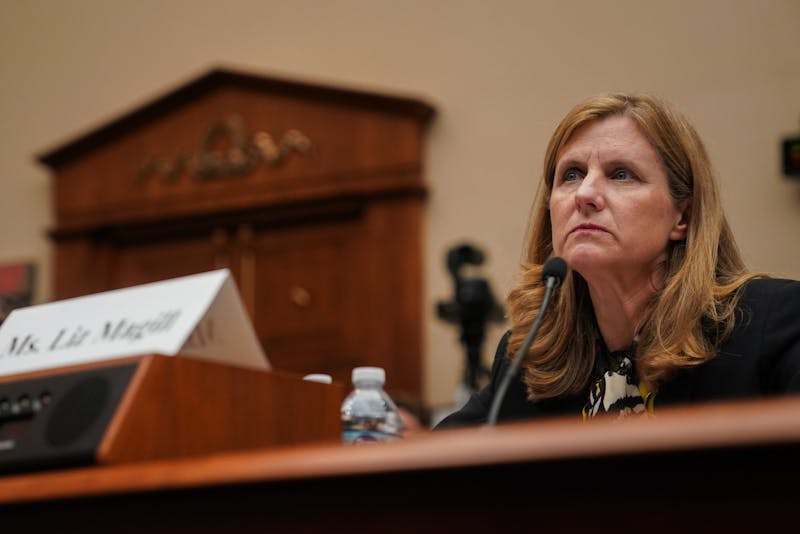
As attacks against diversity, equity, and inclusion programs escalated last year, Penn Medicine paused the work of a committee established to address “disparities and inequities” in the University’s health care system, multiple committee members say.
In fall 2024, the Perelman School of Medicine took down the website of the Anti-Racism Committee at the Clinical Practices of the University of Pennsylvania — an administrative unit which coordinates the work of faculty who actively practice in clinics at Penn. The website included pages on the School of Medicine's antiracism efforts and commemoration of Black History Month.
The committee was established in 2020 to address disparities in the University’s health system. But two committee members alleged a lack of financial and administrative support for the initiative, prompting them to question whether it was merely performative.
Following an inquiry from The Daily Pennsylvanian on Wednesday about the apparent changes to the School of Medicine's DEI efforts, the scrubbed webpages were reactivated. Perelman School of Medicine Vice Dean for Diversity, Equity and Inclusion Roy Hamilton and spokesperson Carmen Lennon did not respond to a request for comment by publication.
The Anti-Racism Committee was charged with “implementing concrete, positive, measurable and fundamental changes to eradicate racism” at the School of Medicine. It was also created to discuss reported incidents of racism in the health system and develop a process to train personnel in discussions of race.
The committee’s website was intended “to document our progress and our efforts,” according to a welcome message from ARC co-chairs Frances Jensen and Maria Oquendo.
“I would say right now the situation is complex and the effort has definitely not been discontinued but is being reimagined to be more effective given the changing landscapes externally,” Jensen, who chairs the Neurology Department, wrote to the DP.
However, two committee members said the panel was plagued with low involvement and a lack of financial and administrative support before it stopped meeting — leading Sonja Ogden, an executive assistant under Jensen who was charged with spearheading DEI programs, to question if it was only developed to “check a box” after the murder of George Floyd in 2020.
“Penn tends to act expeditiously on things that are deemed urgent and of importance to them,” Ogden claimed. “[I]t seems evident that this was not of importance given it has been months since we paused with no update from either leader of ARC.”
The committee’s signature events included a speaker series along with seminars and informative gatherings for Black History Month, Ogden added.
The committee stopped meeting last spring and momentum has since “faded significantly,” ARC member and Diabetes Research Center program manager Lisa Henry claimed in a statement. At the time of publication, the committee’s website does not list any events for this year’s Black History Month, which begins on Saturday.
Henry added that the election of President Donald Trump appears to have “stifled the progress” of the committee, though Ogden claimed that the commitee's work stopped long before Trump's second term began. Trump’s executive orders culled DEI initiatives across the federal government — and encouraged the same to occur at private corporations, nonprofits, and universities.
It remains unclear whether other programs related to DEI at Penn Medicine have been paused or discontinued since Trump’s inauguration and the following blitz of directives from the Oval Office, many of which could impact Penn’s operations. Amid spiraling uncertainty over these actions, Penn announced a review of its programs, policies, and practices in an email from Interim President Larry Jameson on Wednesday.
Ogden also described a “flurry of emergent meetings” taking place as Penn Medicine took stock of the funding freeze, which was rescinded Wednesday afternoon. She wrote that the system was organizing town halls and letters to elected officials.
“[W]e are working with our academic and government relations colleagues to understand and respond to the potential impact of these events,” University of Pennsylvania Health System Interim Executive Vice President and Perelman School of Medicine Dean Jonathan Epstein, wrote in an email to affiliates on Jan. 23.
Penn Medicine maintains a network of around 20 departmental vice chairs for diversity and inclusion, according to Allison Lee, who is the vice chair of diversity and inclusion for the Department of Anesthesiology and Critical Care. The directory of these vice chairs, housed under the ARC, was also taken down until Wednesday afternoon.
A central Office of Inclusion, Diversity and Equity at Penn Medicine lists four employees online and oversees several initiatives, including an annual health equity symposium named for Martin Luther King Jr. and a project to improve retention of faculty of color. Hamilton took over the office in March as part of the system’s 2023-2028 strategic plan, which laid out a goal to “resource the office and aligned programs to continue and refine ongoing work.”
In the same plan, Penn Medicine pledged to establish measures for equity across the system and to administer a climate questionnaire. Henry wrote in a statement that the pledges and commitments to inclusion and a fair climate outlined by the ARC were “erased” before the website returned on Wednesday.
“The removal of the website and its content without input from committee members does not reflect the collaborative nature of our work,” Henry said, adding she was surprised to see the site back up.
The Daily Pennsylvanian is an independent, student-run newspaper. Please consider making a donation to support the coverage that shapes the University. Your generosity ensures a future of strong journalism at Penn.
Donate











